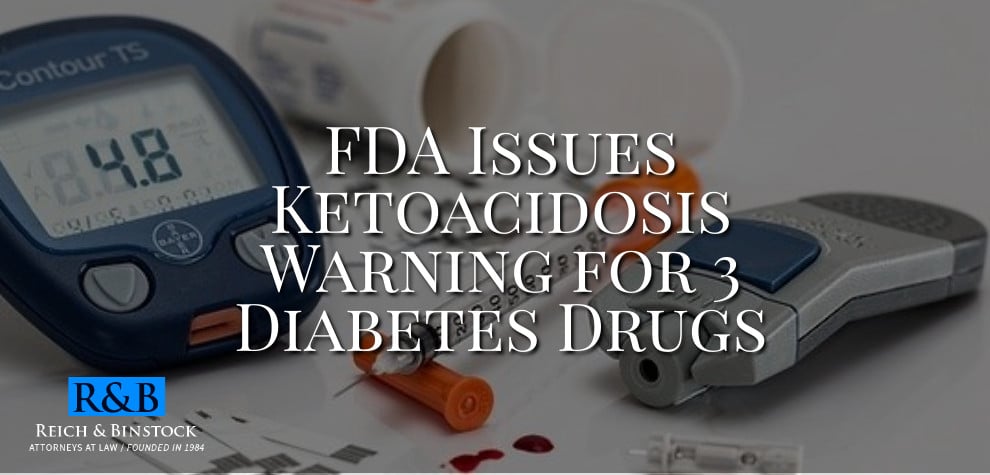The U.S. Food and Drug Administration on May 15 issued a warning about the use of three medicines that have been used in the treatment of Type-2 diabetes. The drugs Invokana (canagliflozin), Farxiga (dapagliflozin) and Jardiance (empagliflozin) “may lead to ketoacidosis, a serious condition where the body produces high levels of blood acids called ketones that may require hospitalization,” according to the agency.
In the meantime, the FDA will continue to investigate the suspected risk, the genesis of which is the FDA’s own adverse incident reports, and the agency will eventually determine whether changes must be made to the prescribing information. These drugs belong to a class known as the sodium-glucose cotransporter-2 inhibitors or SGLT2.
Take Ketoacidosis Warnings Seriously
Ketoacidosis can be pretty serious, according to federal sources. Indeed, the U.S. National Library of Medicine writes that the potentially life-threatening condition “occurs when the body cannot use sugar (glucose) as a fuel source because there is no insulin or not enough insulin. Fat is used for fuel instead. When fat breaks down, waste products called ketones build up in the body.” When it is untreated, ketoacidosis “can lead to severe illness or death.”
Ketoacidosis “is responsible for more than 500,000 hospital days per year at an estimated annual direct medical expense and indirect cost of $2.4 billion,” according to an article that the journal Diabetes Care published in 2009.
The FDA directs patients to seek medical attention right away if they experience ketoacidosis symptoms, which include difficulty breathing, nausea, vomiting, abdominal pain, confusion, and unusual fatigue or sleepiness. The agency also cautions patients not to stop taking and not to change diabetes medications without first talking to their prescribers.
These suspect SGLT2 inhibitors, according to the FDA, “lower blood sugar by causing the kidneys to remove sugar from the body through the urine. These medicines are available as single-ingredient products and also in combination with other diabetes medicines such as metformin.”
Several extended-release versions of metformin have been recalled, due to suspected NDMA contaminates, and many are pushing for Metformin lawsuits across the country. The mix of the two main ingredients has the potential for serious danger.
FDA officials examined the data contained in the FDA Adverse Event Reporting System or FAERS. This database is composed of reports of seeming drug-related complications. Those reports come voluntarily from consumers and from health care professionals. Additionally, manufacturers submit these reports to the FDA but, in most cases, reports from the manufacturer are required under federal regulations to be submitted.
In regard to Invokana (canagliflozin), Farxiga (dapagliflozin) and Jardiance (empagliflozin), the FDA reports the following: “A search of the FDA Adverse Event Reporting System database identified 20 cases of acidosis reported as diabetic ketoacidosis (DKA), ketoacidosis, or ketosis in patients treated with SGLT2 inhibitors from March 2013 to June 6, 2014. All patients required emergency room visits or hospitalization to treat the ketoacidosis. Since June 2014, we have continued to receive additional FAERS reports for DKA and ketoacidosis in patients treated with SGLT2 inhibitors … The median time to onset of symptoms following initiation of drug therapy was 2 weeks (range 1 to 175 days).”
As in most any other instance involving a suspected drug-induced adverse event, the patient is perfectly within his or her right to talk to an attorney about whether there is an entitlement to compensation for medical expenses, lost wages and other losses. The same applies to someone who believes that a ketoacidosis diagnosis stems from the use of Invokana (canagliflozin), Farxiga (dapagliflozin) or Jardiance (empagliflozin). The situation could be a viable case for pharmaceutical injury litigation.













